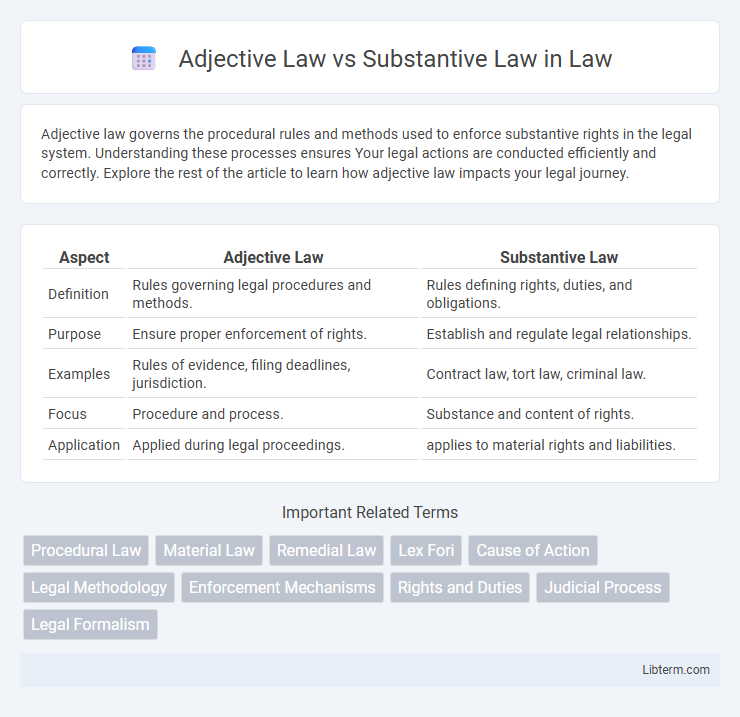Adjective law governs the procedural rules and methods used to enforce substantive rights in the legal system. Understanding these processes ensures Your legal actions are conducted efficiently and correctly. Explore the rest of the article to learn how adjective law impacts your legal journey.
Table of Comparison
| Aspect | Adjective Law | Substantive Law |
|---|---|---|
| Definition | Rules governing legal procedures and methods. | Rules defining rights, duties, and obligations. |
| Purpose | Ensure proper enforcement of rights. | Establish and regulate legal relationships. |
| Examples | Rules of evidence, filing deadlines, jurisdiction. | Contract law, tort law, criminal law. |
| Focus | Procedure and process. | Substance and content of rights. |
| Application | Applied during legal proceedings. | applies to material rights and liabilities. |
Introduction to Adjective Law and Substantive Law
Adjective law, also known as procedural law, governs the methods and means by which substantive law is enforced, including rules of evidence, jurisdiction, and court procedures. Substantive law defines the rights and duties of individuals and collective bodies, determining legal relationships and the consequences of violations. Understanding the distinction between adjective and substantive law is crucial for applying legal principles correctly in judicial processes.
Defining Adjective Law: Meaning and Scope
Adjective Law, also known as procedural law, governs the methods and means by which substantive rights are enforced and protected in courts. This branch of law outlines the processes for trial, including rules of evidence, jurisdiction, and legal remedies, ensuring justice is administered effectively. Unlike substantive law, which defines legal rights and duties, adjective law focuses on the framework and procedures necessary to uphold those rights.
What Constitutes Substantive Law?
Substantive law defines the rights and duties of individuals and collective entities, encompassing areas such as criminal law, contract law, property law, and tort law. It establishes the legal principles that govern how people behave and interact, prescribing what is considered lawful or unlawful conduct. Unlike procedural law, substantive law determines the substance of legal disputes by detailing the legal relationships and obligations that give rise to claims or defenses.
Key Differences Between Adjective and Substantive Law
Adjective law, also known as procedural law, governs the methods and means by which substantive rights and obligations are enforced, including rules for jurisdiction, pleadings, and evidence. Substantive law defines the actual rights and duties of individuals and collective entities, determining how the law applies to real-world situations such as contracts, crimes, and property ownership. The key difference lies in substantive law establishing the legal relationship and duties, while adjective law ensures the proper administration and enforcement of those rights through legal procedures.
Functions and Objectives of Adjective Law
Adjective Law, also known as procedural law, governs the methods and means by which substantive laws are enforced, ensuring fair and orderly legal processes such as filing lawsuits, conducting trials, and enforcing judgments. Its primary function is to provide a structured framework for the administration of justice, facilitating the enforcement of rights and obligations defined by substantive law. By regulating court procedures, evidence handling, and jurisdictional rules, Adjective Law aims to maintain legal consistency, protect procedural fairness, and uphold the efficiency of the judicial system.
Role and Importance of Substantive Law
Substantive law defines the fundamental rights and duties of individuals and entities, establishing the legal framework for determining what is lawful or unlawful. Its role is crucial in ensuring justice by setting the standards for behavior and resolving disputes based on those principles. Substantive law governs matters such as contracts, property, and torts, providing the essential content that procedural (adjective) law enforces.
Examples of Adjective Law in Practice
Examples of adjective law in practice include rules governing the procedures for filing lawsuits, such as statutes of limitations, court jurisdiction, and rules of evidence. These procedural guidelines ensure fair and orderly conduct within the legal system, differentiating them from substantive laws that define rights and duties like contract or criminal law. Adjective law facilitates the enforcement and application of substantive laws by outlining the methods and processes courts follow during legal proceedings.
Substantive Law in Real-World Contexts
Substantive law defines the rights and duties of individuals and collective entities, forming the core framework for legal relationships in real-world contexts such as contract enforcement, property ownership, and criminal liability. It determines what behavior is lawful or unlawful, guiding legal decisions on issues like theft, fraud, or breach of agreement. Unlike adjective law, which governs procedural rules, substantive law directly impacts the outcome of legal disputes and the protection of social interests.
Interrelation Between Adjective and Substantive Law
Adjective law governs the procedures and methods for enforcing rights, directly impacting the application and effectiveness of substantive law, which defines those rights and duties. The interrelation lies in that substantive law establishes the legal principles, while adjective law provides the framework for their practical implementation and adjudication. Without coherent procedural rules, the enforcement of substantive rights would be ineffective, highlighting their inseparable legal interplay.
Summary: Choosing Between Adjective and Substantive Law
Choosing between adjective law and substantive law depends on the legal issue at hand, as substantive law defines rights and duties, while adjective law governs the procedures for enforcing those rights. Substantive law addresses the core legal principles, such as contracts or property rights, whereas adjective law deals with the steps to initiate and conduct legal actions, like filing lawsuits or presenting evidence. Effective legal strategy requires understanding when to rely on procedural rules versus substantive rights to achieve desired legal outcomes.
Adjective Law Infographic

 libterm.com
libterm.com